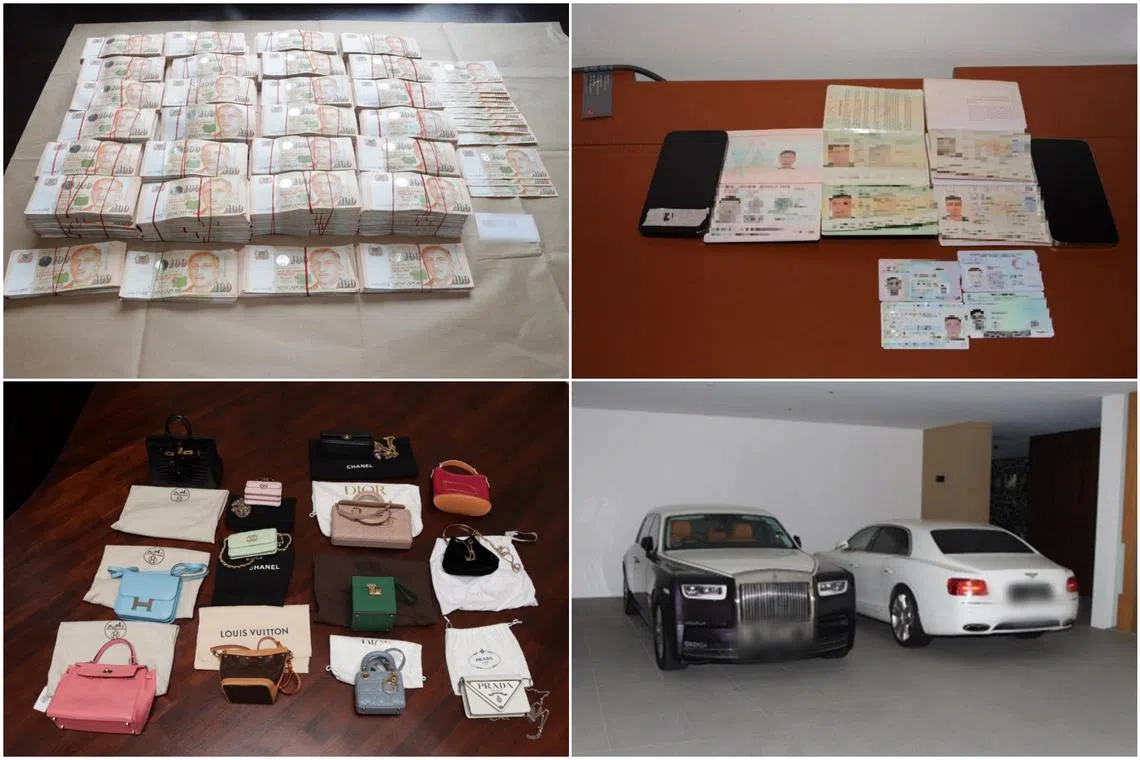Billion-dollar money laundering case widely reported in foreign media
Sign up now: Get ST's newsletters delivered to your inbox

Ten suspects were rounded up in one of Singapore’s biggest anti-money laundering operations.
PHOTOS: SINGAPORE POLICE FORCE
SINGAPORE – The billion-dollar money laundering case
Reports on the 10 suspects, who were rounded up in one of Singapore’s biggest anti-money laundering operations, have been published on major international news sites such as the BBC, CNN, Al Jazeera and Bloomberg.
News outlets in Australia, Cambodia, Cyprus and India also ran reports on this group of foreigners and the luxurious assets they had amassed here.
Although the suspects were all originally from Fujian, in eastern China,
The report was picked up by some Chinese independent news sites, which sparked discussions on where the illicit funds came from, and the wider trend of China’s super-rich relocating to Singapore.
News outlets in Cambodia and Cyprus – an island country in the Mediterranean – raised questions on whether there are systemic loopholes that allow foreigners to easily obtain citizenship in their countries for illicit activities.
The Cyprus Mail reported on Thursday that MP Irene Charalambidou had urged the Interior Ministry to revoke the Cyprus passports of the two accused in this case – Su Haijin, 40, and Wang Dehai, 34.
“The international stigmatisation of our country as a result of the abuse behind the golden passports should be immediately managed by the competent minister,” Ms Charalambidou was quoted as saying.
A golden passport is one granted by a country in exchange for an investment or a donation.
The Organisation for Economic Cooperation and Development has flagged at least 14 countries, including Cyprus, that it says have some variation of a residency or citizenship by investment scheme, which could be misused by some applicants to hide their assets or avoid taxes.
Cambodian news outlet The Phnom Penh Post reported on Thursday that the three accused who hold Cambodian passports had obtained citizenship in recent years.
Su Baolin, 41, and Su Wenqiang, 31, became citizens through the naturalisation process in 2019, while Chen Qingyuan, 33, got his passport in 2018.
According to the report, there are several criteria a foreigner must meet to become a naturalised Cambodian. These include living in Cambodia for at least seven years, not having a criminal record and being able to fluently write and speak Khmer, the official and national language of Cambodia.
Mr Pech Pisey, executive director of Transparency International Cambodia, told The Phnom Penh Post that the billion-dollar money laundering case could affect Cambodia’s international reputation.
Transparency International is a global non-governmental organisation set up to tackle the issue of corruption around the world.
He said: “As the suspects reportedly held Cambodian citizenship, the police would investigate whether any of their financial transactions took place in Cambodian territory.
“One lesson that can be learnt from this case is that we should abide by the laws when issuing citizenship to foreign nationals, with transparency and integrity.”



